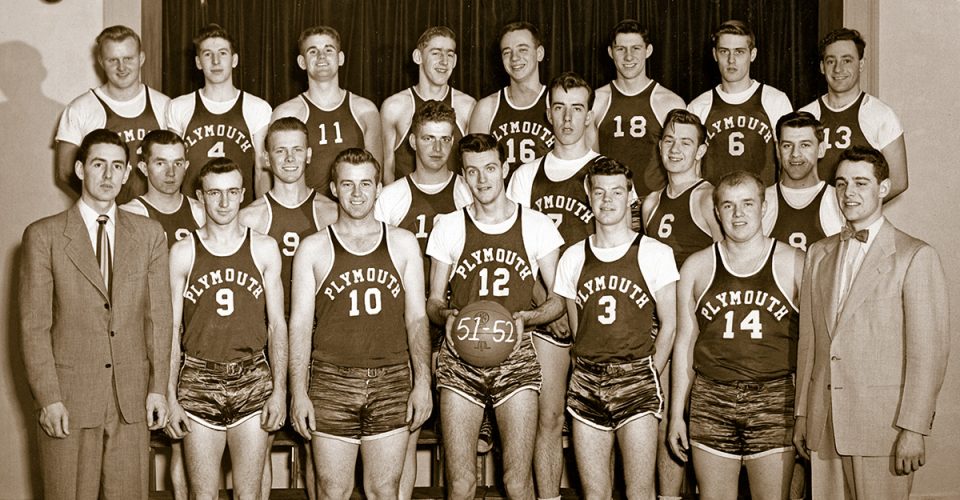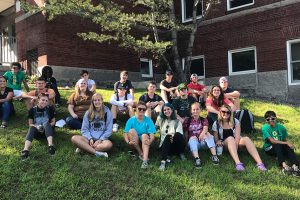Coach Foley (on left) and Ernie Beals (number 9), together with 1951–52 men’s basketball team.
“A life is not important except in the impact it has on other lives.” Jackie Robinson’s wisdom has been modeled over the generations at Plymouth State, including the life-changing impact that Hall of Fame Coach John C. Foley had on Ernie Beals ’53.
Beals grew up in Hudson, MA. His parents divorced before his first birthday, leaving him without a father figure. In 1946, he moved to Ashland, NH. Beals was a baseball player and dreamed of getting to the big leagues. He was good enough to earn a tryout with the Boston Braves, but he had two strikes against him. “They didn’t like that I was wearing glasses at age 18,” Beals chuckles. “And I weighed 145 pounds.”
Nevertheless, the Braves arranged for Beals to play in the Northern League, similar to the well-known Cape Cod League. Early in the season, while playing in a light rain, a bolt of lightning shot through the sky. “It was an epiphany for me,” says Beals. “I realized this wasn’t for me, but I thought that if I can’t play maybe I’ll get into coaching.”
Beals had always loved school and decided college was the next step. Because of his limited resources, Plymouth Teachers College was the only option he could afford. A two-sport athlete, he tried out for the basketball team in the fall of his first year and was surprised when Coach Foley selected him for the varsity squad.
“I was very happy with practice, but that didn’t last long,” Beals remembers. “He was all over me, day after day after day. He was yelling, stamping his foot, and throwing his hands in the air.” After two weeks, Beals had had enough. Basketball wasn’t fun anymore. He strolled into Foley’s office, and he was prepared to quit. After hearing Beals out, Foley firmly told him to take a seat. What Beals had expected to be a short, five-minute conversation turned into an hour-long talk that would have a profound impact on him.
“I think you can become a good point guard,” Foley said. “But it’s not going to happen if you just stay the same every day. You’ve got to get better every day.” It was that message that shaped Beals’ future: striving each day to be better than he was the day before.
“I was stunned,” Beals says. “Okay coach, I said, I would like to stay with the team.”
Foley’s coaching style didn’t change after the life-altering conversation. “Not one bit,” laughs Beals. “But going into it, I could see the twinkle in his eye and I had a smile on my face. I ended up being a point guard for my last two years.”
Beals carried the lesson with him when he was drafted into military service, during his career as a coach and teacher, admissions officer and, most notably, when he served as a guidance director.
Beals turned 88-years-old in September and still approaches life with that confidence. “I live life one day at a time,” he says. “I get up in the morning and say ‘I’m going to enjoy today,’ and I do.”
■ Chris Kilmer ’99








